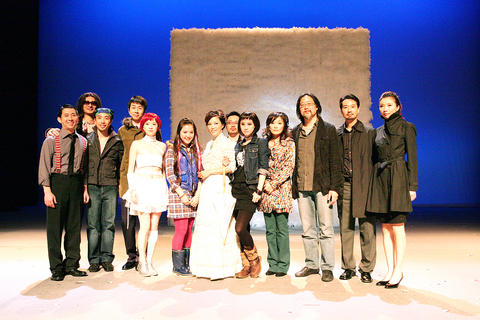Murder, adultery, neglect and a little detective work are at the heart of Performance Workshop's (表演工作坊) newest play, Like Shadows (如影隨行), which opens tonight at the National Theater.
The 150-minute play was originally written while Stan Lai (賴聲川), Performance Workshop's artistic director, was a visiting professor at Stanford University teaching a class on collective creation through the use of improvisation, his method for training and collaborating with actors to produce work for the stage.
"I started by asking my student actors: 'Are you aware of any of your family or friends who have recently passed away but are having trouble going to the next stage,'" he said to the Taipei Times.

PHOTO: COURTESY OF NTCH
"Whatever your religious background or philosophical beliefs, wherever you think people go after they die, a person might not get there because of some sort of obsession or some attachment to life."
One student from Chicago talked about a friend whose father killed his mother thinking that she was having a affair with a neighbor. The father then killed himself. Lai took the story as the topic of his students' workshop, which spawned Stories for the Dead.
"It became incredibly interesting to me … a sort of unfolding of events. We started from a real event and start unfolding the fictitious events which were much more interesting. And lots of other characters came out - some imaginary, some real, and it became a tapestry of real and unreal figures," Lai said.
Similar to the original work Like Shadows follows the life of a troubled teenaged girl, who is investigating the cause of her mother's death and her father's mysterious disappearances and in the process becomes capable of communicating with the spirit world. When her parents suddenly begin to appear to her, shocking secrets about her family tragedy are revealed.
"The play is a lot about neglect, you know, families, dysfunctional families, that neglect each other, people who neglect each other," Lai said.
The themes covered in Like Shadows are outside the norm for Lai, who often investigates forgotten Chinese theatrical forms and obscure stories and then revives them. "I rarely work with murder," he said. "But why not. This is America, right?" he said, alluding to the Americanization of global society. "Violent stories are the norm and in Asia this not a special thing."
Though the story is set in America, its themes and imagery are comprehensible to most Taiwanese people because Lai incorporates ideas that he gleaned from Buddhism, a religion he has practiced for more than 30 years.
"Since Dream like a Dream (如夢之夢) in 2000, I've become less and less shy about my own practice (of Buddhism) and more of it is becoming unashamedly (part of) my work," he said.
Buddhism, then, becomes the lens through which Lai investigates the girl's life, the mysteries she reveals and how she is able to come to terms with her troubled past.
"I think the whole thing about Buddhism is opening your boundaries and saying that what we see, of course, is not the whole deal and what we feel is not the whole deal. All sorts of things are intersecting that we are not aware of," Lai said.

One of the biggest sore spots in Taiwan’s historical friendship with the US came in 1979 when US president Jimmy Carter broke off formal diplomatic relations with Taiwan’s Republic of China (ROC) government so that the US could establish relations with the People’s Republic of China (PRC). Taiwan’s derecognition came purely at China’s insistence, and the US took the deal. Retired American diplomat John Tkacik, who for almost decade surrounding that schism, from 1974 to 1982, worked in embassies in Taipei and Beijing and at the Taiwan Desk in Washington DC, recently argued in the Taipei Times that “President Carter’s derecognition

This year will go down in the history books. Taiwan faces enormous turmoil and uncertainty in the coming months. Which political parties are in a good position to handle big changes? All of the main parties are beset with challenges. Taking stock, this column examined the Taiwan People’s Party (TPP) (“Huang Kuo-chang’s choking the life out of the TPP,” May 28, page 12), the Democratic Progressive Party (DPP) (“Challenges amid choppy waters for the DPP,” June 14, page 12) and the Chinese Nationalist Party (KMT) (“KMT struggles to seize opportunities as ‘interesting times’ loom,” June 20, page 11). Times like these can

Dr. Y. Tony Yang, Associate Dean of Health Policy and Population Science at George Washington University, argued last week in a piece for the Taipei Times about former president Ma Ying-jeou (馬英九) leading a student delegation to the People’s Republic of China (PRC) that, “The real question is not whether Ma’s visit helps or hurts Taiwan — it is why Taiwan lacks a sophisticated, multi-track approach to one of the most complex geopolitical relationships in the world” (“Ma’s Visit, DPP’s Blind Spot,” June 18, page 8). Yang contends that the Democratic Progressive Party (DPP) has a blind spot: “By treating any

You can tell a lot about a generation from the contents of their cool box: nowadays the barbecue ice bucket is likely to be filled with hard seltzers, non-alcoholic beers and fluorescent BuzzBallz — a particular favorite among Gen Z. Two decades ago, it was WKD, Bacardi Breezers and the odd Smirnoff Ice bobbing in a puddle of melted ice. And while nostalgia may have brought back some alcopops, the new wave of ready-to-drink (RTD) options look and taste noticeably different. It is not just the drinks that have changed, but drinking habits too, driven in part by more health-conscious consumers and